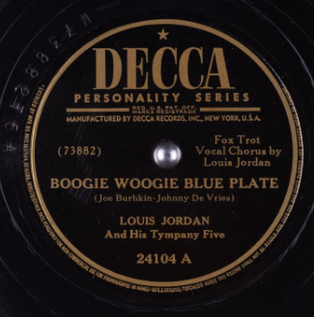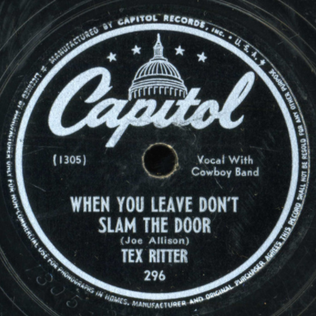"How High the Moon" is a jazz standard with lyrics by Nancy Hamilton and music by Morgan Lewis. It was first featured in the 1940 Broadway revue Two for the Show, where it was sung by Alfred Drake and Frances Comstock. In Two for the Show, this was a rare serious moment in an otherwise humorous revue.

Nellie Rose Lutcher was an American R&B and jazz singer and pianist, who gained prominence in the late 1940s and early 1950s. Lutcher was most recognizable for her diction and exaggerated pronunciation and was credited as an influence by Nina Simone among others.
"Buttons and Bows" is a popular song with music written by Jay Livingston and lyrics by Ray Evans. The song was published on February 25, 1948 by Famous Music Corp., New York. The song was written for and appeared in the Bob Hope and Jane Russell film The Paleface and won the Academy Award for Best Original Song. It was originally written with an Indian theme, but was changed when the director said that would not work in the movie. It was a vocal selection on many radio programs in late 1948. It was reprised in the sequel, Son of Paleface, by Roy Rogers, Jane Russell and Bob Hope. In 2004 it finished #87 in AFI's 100 Years...100 Songs survey of the top tunes in American cinema.
This is a list of notable events in country music that took place in the year 1949.
This is a list of notable events in country music that took place in 1948.
This is a list of notable events in country music that took place in 1947.
This is a list of notable events in country music that took place in the year 1946.
This is a list of notable events in country music that took place in the year 1945.
This is a list of notable events in country music that took place in the year 1944.
"Imagination" is a popular song with music written by Jimmy Van Heusen and the lyrics by Johnny Burke. The song was first published in 1940. The two best-selling versions were recorded by the orchestras of Glenn Miller and Tommy Dorsey in 1940.

"Smoke! Smoke! Smoke! " is a Western swing novelty song written by Merle Travis and Tex Williams, for Williams and his talking blues style of singing. Travis wrote the bulk of the song. The original Williams version went to number one for 16 non-consecutive weeks on the Hot Country Songs chart and became a number one hit in August 1947 and remained at the top of the "Best Sellers in Stores" chart for six weeks. It was written in 1947 and recorded on March 27, 1947, at Radio Recorders in Hollywood.

"Texas and Pacific" is a song written by Jack Wolf Fine and Joseph E. Hirsch. It was performed by Louis Jordan and his Tympany Five, recorded in October 1946, and released on the Decca label. The song describes a rider's experience on the Texas & Pacific Railway. The "B" side of the record was "I Like 'Em Fat Like That".

"Jack, You're Dead" is a song written by Dick Miles and Walter Bishop. It was performed by Louis Jordan and his Tympany Five, recorded in October 1946, and released on the Decca label. The song describes a man's physical state if he fails to respond to romance.

"Boogie Woogie Blue Plate" is a song written by Joe Burhkin and Johnny DeVries. It was performed by Louis Jordan and his Tympany Five and released on the Decca label.

"When You Leave, Don't Slam the Door" is a country music song written by Joe Allison, performed by Tex Ritter, and released on the Capitol label. In October 1946, it reached No. 3 on the Billboard folk chart. It was also ranked as the No. 23 record in Billboard's 1946 year-end folk juke box chart.
The Billboard Most-Played Folk Records of 1947 is a year-end chart compiled Billboard magazine ranking the year's top folk records based on the number of times the record was played on the nation's juke boxes. In 1947, country music records were included on, and dominated, the Billboard folk records chart.
The Billboard Most-Played Folk Records of 1946 is a year-end chart compiled Billboard magazine ranking the year's top folk records based on the number of times the record was played on the nation's juke boxes. In 1946, country music records were included on, and dominated, the Billboard folk records chart.
Billboard Most-Played Race Records of 1947 is a year-end chart compiled by Billboard magazine ranking the year's top race records based on the number of times the record was played on the nation's juke boxes.Billboard assigned point totals to each record based on its juke box plays.
Billboard Most-Played Race Records of 1946 is a year-end chart compiled by Billboard magazine ranking the year's top race records based on the number of times the record was played on the nation's juke boxes.Billboard assigned point totals to each record based on its juke box plays.

"Hurry on Down" is a song written and sung by Nellie Lutcher with backing on the record by a group called "Her Rhythm". Lutcher also played the piano on the record which was released in 1947 on the Capitol Americana label. It debuted on the Billboard magazine's race records chart on August 16, 1947, peaked at No. 2, and remained on the chart for 18 weeks. It was ranked No. 10 on the magazine's year-end list of the most played race records of 1947.







